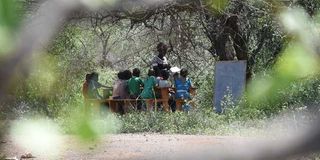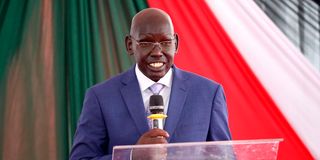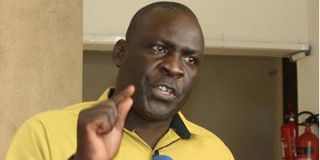
A teacher and her Grade One pupils at Chepng'arwa Primary School in Tiaty, Baringo County.
The Competency-Based Curriculum is entering a definitive phase with the pioneering class gearing for the first national examinations scheduled for the end of the year, setting the stage for transition to senior secondary school.
Yet critical issues remain unresolved and risk precipitating a turbulent transition in January next year. These include criteria for placement of learners to senior school, career choice, subjects’ combination, funding and preparedness of high schools to admit the first cohort of learners.
Last week, outgoing Basic Education Principal Secretary Belio Kipsang sparked a fresh debate when he pronounced that mathematics, historically a key subject in any curriculum, would be optional in senior school.
Dr Kipsang asserted that students opting to pursue social sciences, creative arts and sports would not necessarily be required to offer maths, the argument being the subject was not essential in their learning areas.
Clearly, that pronouncement has not gone well, with questions arising over the completeness of an education system that locks out learners from acquiring numerical and computing skills that are pivotal in any field in the technology-based work environment.
For context, the PS’ declaration was based on the Basic Education Curriculum Framework first published by the Kenya Institute of Curriculum Development in 2017 and revised in 2019 and, which provided for three learnings pathways in senior school and with nine tracks (areas of specialisations) based on learners’ capabilities and preferences. The rationale was that maths was not essential for every learning area and that it was unreasonable to force every learner to pursue the subject just for the sake of it. A sub-text was that thousands of high schoolers flunked maths every year, meaning it was never helpful to them.

A schoolgirl solves a maths problem.
Notwithstanding, the ensuing debate has demonstrated information gaps about CBC and two, the lingering question about the philosophy of the curriculum. Implicitly, questions still abound about the kind of education the country needs and how best to implement it, including the subjects to be taught in schools, and why? Added to this is the testing, which combines formative and summative formats and, which though noble, are fraught with reliability and validity concerns.
The changeover from 8-4-4 system to CBC was intended to address deficiencies in the education system, including its orientation towards exams rather than knowledge and skills acquisition. Consequently, CBC was intended to cure this malady by inculcating knowledge and skills. However, its implementation has been defective raising questions about its practicality and novelty.
Over the past three years, implementation of junior secondary school education has tumbled from one crisis to another. First was the executive directive by Kenya Kwanza administration to domicile it in primary schools which did not have resources and capacities to manage it. Acute teacher shortage, teacher unpreparedness, lack of textbooks and other teaching and learning resources combined to make the transition terrible.

Outgoing Basic Education PS Belio Kipsang.
Two weeks ago, the Education ministry launched county dialogues to appraise citizens at the local level of the status of CBC implementation and the next steps. And the overwhelming concern was that CBC execution was extremely wanting. Not surprisingly, many parents are abandoning it and enrolling their children for foreign curriculum.
In this mix, the declaration that maths will be relegated to an optional subject only served to deepen the anxieties and fortify the perception that the curriculum had not been properly thought out. Hopefully, the emerging concerns should make the Education ministry rethink that proposition on maths.
The country needs to debate the preparedness of high schools to implement CBC. This is because issues such teacher training to equip them with requisite skills and methodologies for CBC has not been done. Funding and infrastructure upgrade for the senior schools have not been thought through yet the institutions require a makeover for successful curriculum implementation.
But back to the basics. How will students be selected and placed in senior secondary school? Typically, selection and placement of learners in Form One has been based on performance in the primary school terminal examinations. Schools have historically been classified as national, provincial (county) and district and private. The top candidates in the exams got placed in national schools and others got admission to county and sub-county schools in that order based on their performance.
However, based on the recommendations of the Presidential Working Party on Education Reforms Education, that clustering will be done away in the new dispensation. Instead, schools will be classified according to the subject offerings. A three-tier system has been proposed as follows: STEM centres offering science, technology, engineering and mathematics; social sciences and arts schools focusing on humanities and the arts; and creative arts and sports schools specialising in sports and the creatives.
Theoretically then, selection will be based on subject choices. But here is the snag. How do learners make the decision on what school to choose? Is junior school education sufficient to prepare a learner to make an informed decision? Are the teachers well prepared to guide the learners on appropriate career choices?
At the high school level, crisis looms over deficient teaching and learning resources, including laboratories and workshops. Presently, secondary schools are reeling under huge debts due to acute financial crisis arising from inadequate government capitation and regulated fees that were introduced in 2014 and which does not reflect the current economic realities.

Kenya Union of Post-Primary Education Teachers National Chairman Omboko Milemba at a past event.
Indeed, the chairman of Kenya Union of Post-Primary Education Teachers (Kuppet), Mr Omboko Milemba, has warned of pending disaster in high schools next year because the government has not made any preparation for the CBC cohort transition. For a good measure, the government has not even budgeted for CBC in the 2024/25 financial year.
The country is staring at a major crisis in the coming months as CBC pioneers shift to senior school and therefore, it is incumbent to tackle the vexed issues to forestall an inevitable catastrophe. CBC was touted as a critical reform strategy but if not properly managed, risks running into the same headwinds as happened with its precursors.
David Aduda is Consulting Editor and Education Specialist. [email protected]











